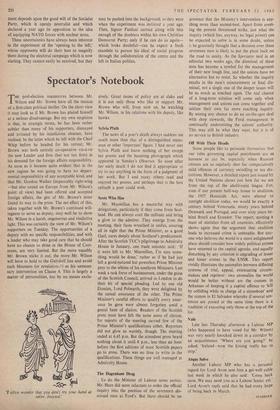Spectator's Notebook
T/7" HE post-election manoeuvres between Mr. Wilson and Mr. 3rown have all the tension of a first-class political thriller. On the short view it may look as if Mr. Brown has placed himself at a serious disadvantage. But my own suspicion is that, in strategic terms, he has been rather subtler than many of his supporters, dismayed and irritated by his injudicious absence, have realised. In the letter which he left with the Chief Whip before he headed for his retreat, Mr. Brown was both entirely co-operative vis-a-vis the new Leader and firm (but not too firm) in his demand for the foreign affairs responsibility. As soon as it became quite evident that in the new regime he was going to have no depart- mental responsibility of any acceptable kind, and that Mr. Gordon Walker (impeccably right-wing —but also sound on Europe from Mr. Wilson's point of view) had been offered and accepted foreign affairs, the gist of Mr. Brown's letter found its way to the press. The net effect of this, taken together with Mr. Brown's continued will- ingness to serve as deputy, may well be to show Mr. Wilson in a harsh, ungenerous and vindictive light. This was certainly the view of Mr. Wilson's supporters on Tuesday. The opportunities of a deputy with no specific responsibilities, and with a leader who may take good care that he should have no chance to shine in the House of Com- mons, are very limited. But the more equably Mr. Brown sticks it out, the more Mr. Wilson will have to hold to the Gaitskell line and avoid such bloomers (or revelation,?) as his unneces- sary intervention on Clause 4. This is largely a matter of personalities, but by no means exclu- 'I often wonder that you don't try your hand at satire. Juvenal.' sively. Great issues of policy are at stake and it is not only those who like or support Mr. Brown who will, from now on, be watching Mr. Wilson, in his relations with his deputy, like hawks.


































 Previous page
Previous page